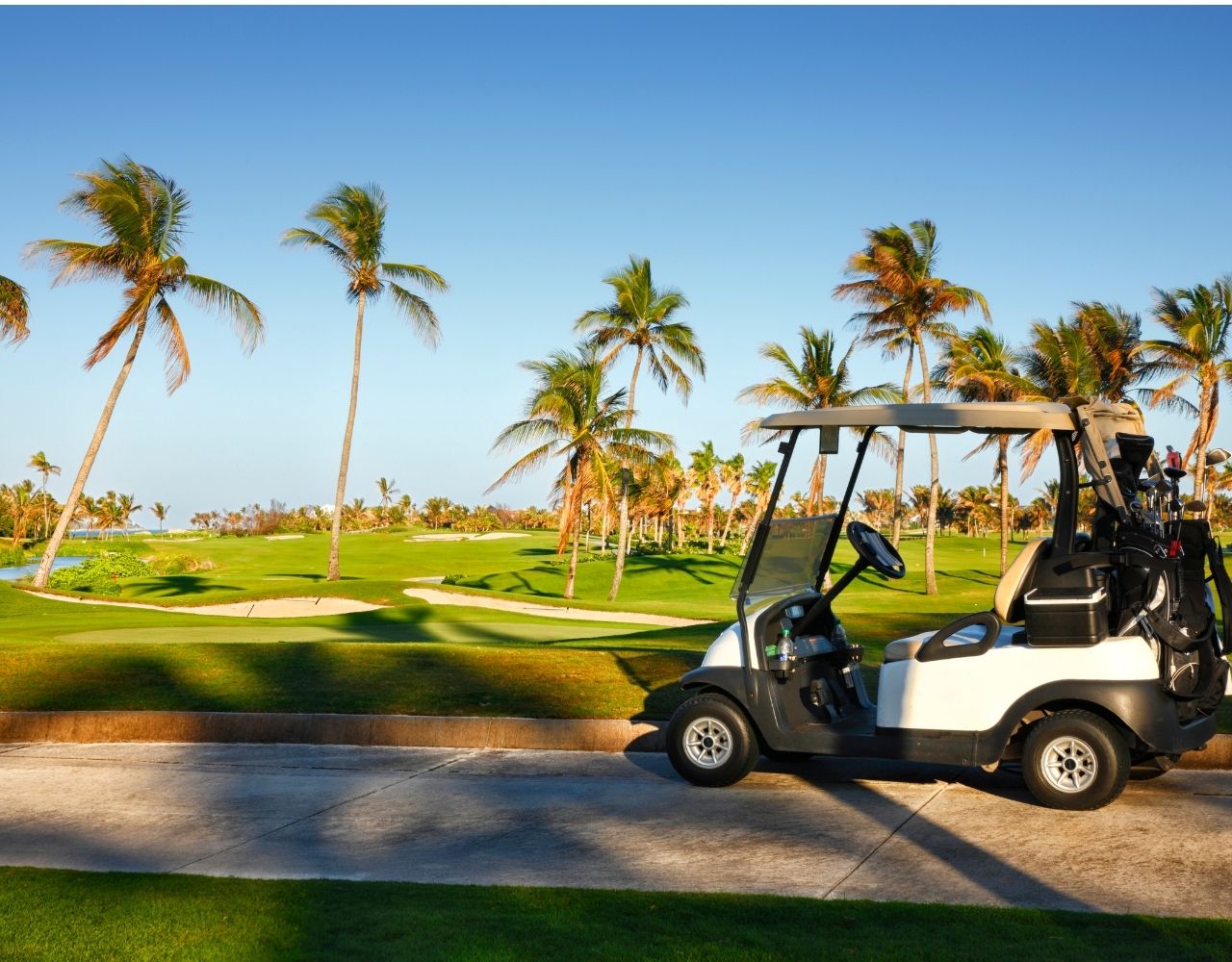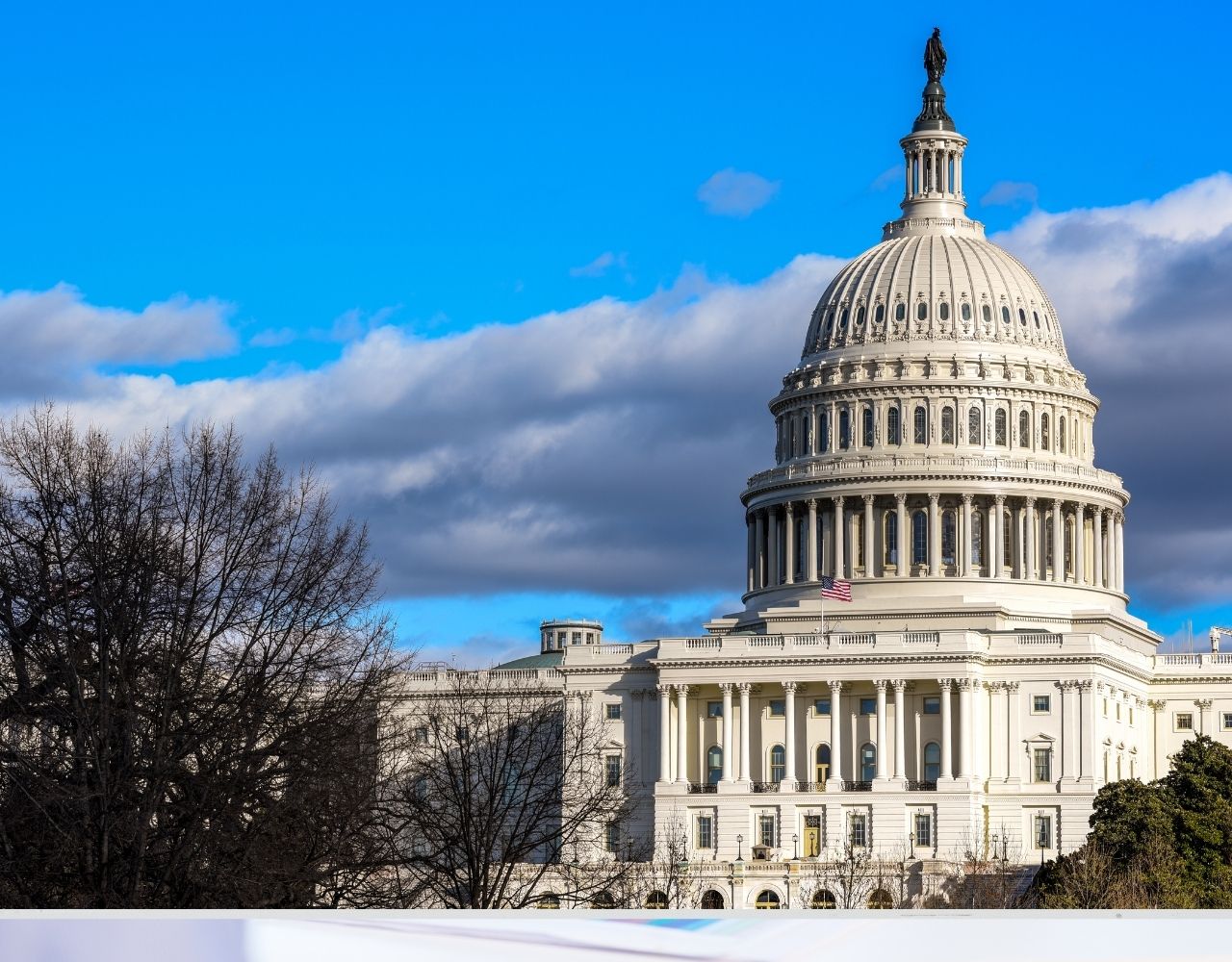Florida Golf Cart Owners Should Beware of Huge Potential Liability

July/August 2024 | © 2024 Nelson & Nelson, P.A.
By Barry A. Nelson and Cassandra S. Nelson
As published in: The Florida Bar Journal, July/August 2024.
This Florida Bar Journal column is submitted on behalf of the Real Property, Probate and Trust Law Section, Sarah Swaim Butters, chair, and Allison Archbold and Homer Duvall, editors.
A Miami-Dade County trial court awarded over $50 million in damages in a personal injury lawsuit brought on behalf of a 12-year-old passenger (Bennar) who sustained catastrophic head injuries after he was thrown from a golf cart negligently driven by a 16-year-old (Acuna).[1] The golf cart’s owner (Chiong) was Acuna’s step-uncle.[2] Chiong authorized Acuna to drive the golf cart, and, on July 4, 2016, Acuna drove Chiong’s son and three other children, including Bennar, in the neighborhood where Chiong and Bennar resided.[3] While operating the golf cart, Acuna failed to stop at a stop sign, causing the cart to be struck by an automobile and roll over onto one side, ejecting and injuring everyone in the golf cart.[4] Bennar had the most severe injuries.[5] His parents brought a personal injury lawsuit against Chiong as the person “in possession and control” of the golf cart and Acuna as the driver of the golf cart.[6] The authors assume, but are not certain, that the personal injury lawsuit was brought against Chiong as the person “in possession and control” of the golf cart because it was unknown or unclear whether Chiong was the owner of the golf cart (since golf carts often lack title and registration).
After a bench trial, the court concluded that Chiong was the golf cart owner, owed Bennar and his parents a duty of reasonable care, breached his duty of care, and was negligent in entrusting the golf cart to Acuna, who negligently operated it, causing the crash and resulting injuries to Bennar.[7] The court awarded Bennar $23,051,632 for his past and future economic damages and $23,051,632 for his past and future noneconomic damages, including his pain and suffering, and each of his parents $2 million for loss of consortium, for a grand total of $50,103,264.[8]
Prior to the trial, Acuna entered into an $18 million consent judgment with Bennar’s parents.[9] Acuna was covered under her parents’ GEICO General Insurance Company liability insurance policy for bodily injury and property damage arising from the use of a “non-owned auto.”[10]
GEICO filed a separate declaratory action in the U.S. District Court for the Southern District of Florida seeking a ruling that the insurance policy it issued to Acuna’s parents did not cover Acuna’s golf cart accident.[11] GEICO contended that it was not required to defend or indemnify Acuna or her parents for the accident because the golf cart did not meet the definition of a “private passenger auto.”[12] The district court granted GEICO’s motion for summary judgment,[13] and Acuna’s parents appealed its decision to the U.S. Court of Appeals for the 11th Circuit.[14] The 11th Circuit determined that the golf cart was covered under the GEICO policy, reversed the district court’s summary judgment order, and remanded the case for further proceedings.[15]
This article describes the potential financial exposure under Florida law for golf cart owners when injury is caused either by the golf cart owner’s negligent driving or the negligent driving of another authorized person. This article also addresses the need for golf cart owners to carefully review their auto insurance, homeowners insurance, and general liability (aka, excess risk or umbrella) policies to confirm that adequate insurance coverage exists for the operation of their golf carts.
A person with a golf cart-related injury has at least two potential defendants to sue for damages: the golf cart owner and, if different from the owner, the golf cart driver. In all instances, insurance coverage must be determined. For example, if the driver is insured then the question is whether the insured driver’s auto or other insurance policy insures the operation of golf carts. If the golf cart driver is a minor or an adult living full time at his or her parents’ residence and is listed as an additional insured under the parents’ auto insurance policy, then it is critical to determine whether the golf cart driver is insured under his or her own auto or other insurance policy, or the auto or other insurance policy of his or her parents, as was the case with Acuna. Two separate insurers (i.e., the golf cart owner’s insurance carrier and the golf cart driver’s insurance carrier) may have obligations to defend against the claims filed by injured golf cart passengers.
Liability as Golf Cart Owner
As described above, Gonzalez v. Chiong, No. 2017-010063-CA-01 (Fla. 11th Jud. Cir. Sept. 19, 2023), addressed whether a golf cart owner is liable for damages if he or she loans a golf cart and its driver negligently causes injuries. The court’s 13-page findings of fact and conclusions of law provided a detailed analysis, including the following conclusions of law relevant to this article:
- “Chiong owed the plaintiffs a duty of reasonable care. [Chiong] breached that duty of care and was negligent in entrusting the golf cart to…Acuna who negligently operated it, causing the crash at issue and the resulting damages.”[16]
- “The Florida Supreme Court has held that a golf cart is a dangerous instrumentality.”[17]
- “Chiong was the legal owner of the golf cart, and…the golf cart was a dangerous instrumentality.”[18]
- “The Dangerous Instrumentality doctrine imposes vicarious liability upon the owner of a motor vehicle who voluntarily entrusts it to an individual whose negligent operation of it causes damage to another.”[19]
- “Acuna was negligent and 100% responsible for causing the subject crash.”[20]
- “[U]nder the dangerous instrumentality doctrine…Chiong is liable and responsible for the negligent operation of the golf cart by…Acuna at the time of the crash and for the damages in this case.”[21]
- “Damages were not disputed or challenged in any way…Bennar’s injury left him totally and permanently physically and mentally disabled.”[22]
The authors reached out to Paul Jon Layne of Silva & Silva, P.A., attorney for the Bennars, and were advised that the decision was not appealed and the time for appeal has passed.
Theories of Liability
Although the Chiong court concluded that Chiong owed the plaintiffs a duty of care and breached that duty when he negligently entrusted the golf cart to his 16-year-old step-niece, whose negligent operation caused the crash and resultant damages, it is important to note that other cases have applied the dangerous instrumentality doctrine and imposed vicarious liability upon the motor vehicle owner who voluntarily, but not negligently, entrusted a motor vehicle to another and the driver injured another person.[23] Accordingly, it appears there are two theories that could create liability exposure for a golf cart owner who lends his or her golf cart to another: 1) negligent entrustment (e.g., the golf cart owner entrusted the golf cart to a minor or someone intoxicated or otherwise incapable of safely operating the golf cart); and 2) Florida’s dangerous instrumentality doctrine, which does not require the golf cart owner to be negligent in loaning the golf cart, but which holds the golf cart owner liable for damages caused by the negligent operation by an authorized user.
Dangerous Instrumentality Doctrine
Saullo v. Douglas, 957 So. 2d 80 (Fla. 5th DCA 2007), provides an excellent summary of the application of Florida’s dangerous instrumentality doctrine, which is based on common law principles governing master and servant relationships. It stated:
At common law the master was liable for his or her servant’s negligence when the servant was entrusted with and had the custody and control of a dangerous instrumentality at the time of the injury…We generally see the dangerous instrumentality doctrine applied to impose strict vicarious liability on the owner of a motor vehicle who voluntarily entrusts it to a person whose negligent operation causes injury to another.[24]
In Meister v. Fisher, 462 So. 2d 1071 (Fla. 1984), the Florida Supreme Court considered whether a country club’s rental of a golf cart to a golfer would subject the country club to the dangerous instrumentality doctrine, in which event the country club could be held vicariously liable for injuries sustained in a golf cart accident. The court concluded:
A golf cart is clearly a motor vehicle. The legislature has recently specifically so defined it in [§]316.003(68), Florida Statutes (1983), which states: (68) GOLF CART.-A motor vehicle designed and manufactured for operation on a golf course for sporting or recreational purposes.
The Meister opinion addressed whether a vehicle must be operated on public highways before the dangerous instrumentality doctrine could come into play and found that “it was never the intention of this [c]ourt to so limit the doctrine.”[26] It quoted Reid v. Associated Engineering of Osceola, Inc., 295 So. 2d 125, 129 (Fla. 4th DCA 1974), as follows:
We see neither reason nor logic in the view that a motor vehicle in operation, which is a dangerous instrumentality while being operated upon the public highway, somehow ceases to be a dangerous instrumentality the instant the driver causes it to turn off the public street or highway onto a private drive or other private property. Although it is most probable that a motor vehicle being operated on private property would be moving at a slower speed than one being operated upon the public street or highway, common sense tells us that in all other respects such vehicle while in motion is equally dangerous to persons and property no matter where it is operated.[27]
The Meister opinion also addressed whether golf carts pose a sufficient danger to the public to impose vicarious liability, stating:
We have no difficulty in determining that they do…Florida’s tremendous tourist and retirement communities make golf carts and golf courses extremely prevalent in this state. And there is evidence…that ‘the types of accidents caused by the operation of the carts are due to the particular design features of the carts and are identical to those involving other motor vehicle accidents.’[28]
The Florida Supreme Court’s decision in Meister noted that the fact that the country club had rented a golf cart to the operator did not call for a different result compared to when an owner loans a golf cart.[29]
Liability Cap
F.S. §324.021(9)(b)3 provides the following liability caps on a natural person who owns a motor vehicle and loans it to a permitted user: 1) $100,000 per person; 2) $300,000 per incident for bodily injury; and 3) up to $50,000 for property damage. If a permitted user of the motor vehicle is uninsured or has insurance with combined property damage and bodily injury limits of less than $500,000, the motor vehicle owner shall be liable for up to an additional $500,000 in economic damages only arising out of the use of the motor vehicle.[30] The additional specified liability of the owner for economic damages shall be reduced by amounts actually recovered from the permitted user and from any insurance covering the permitted user.[31] The motor vehicle owner’s liability limitations from actions of a permitted user shall not affect the motor vehicle owner’s liability for his or her own negligence.[32]
Chiong makes no reference to §324.021. This is presumably because §324.021(1) defines a motor vehicle as “[e]very self-propelled vehicle that is designed and required to be licensed for use upon a highway” and based upon such definition, a golf cart may not be considered a motor vehicle for purposes of the owner liability cap in §324.021(9)(b)3. This is consistent with American States Insurance Company v. Baroletti, 566 So. 2d 314 (Fla. 2d DCA 1990), in which the Second District Court of Appeal held that, in Florida, a golf cart is not a motor vehicle subject to statutory financial responsibility or the motor vehicle no-fault law unless it is operated on highways, even though a golf cart is a dangerous instrumentality.
Assuming a golf cart is not a motor vehicle, it appears that its owner has general unlimited vicarious liability for its operation by a permitted person.[33] Accordingly, in most cases the golf cart owner can be found liable for damages caused by the driver’s negligence.
The consequences of a golf cart not being considered a “motor vehicle” under F.S. §324.021 are severe, as illustrated by the following examples distinguishing unlimited golf cart vicarious liability from limited automobile vicarious liability.[34]
Example 1 (Father Loans Golf Cart to Son)
If a golf cart owner (father) loans his golf cart to his 45-year-old son (son) who has an excellent driving record and is sober, and the son drives a friend (friend) to the community golf course that is a quarter mile from the father’s house, the golf cart is permitted and customarily driven in the father’s community, the golf cart is not designed and required to be licensed for use upon the highway, and the son negligently fails to stop at a stop sign and is involved in an accident in which the friend is severely injured, it appears that there would be no limit on the father’s financial liability exposure for the son’s negligence.
Although Meister held that the owner of a golf cart is subject to vicarious liability even if the golf cart is not designed to be operated on public highways, the liability caps in F.S. §324.021(9)(b)3 are not applicable because they only apply to “motor vehicles,” defined in F.S. §324.021(1) as those “designed and required to be licensed for use upon the highway.”
Example 2 (Father Loans Automobile to Son)
If father loans his automobile to his son to drive to the golf course with a friend and son negligently fails to stop at a stop sign and is involved in an accident in which the friend is severely injured, the liability to the father for injuries caused by son’s negligence in driving the automobile would be limited by F.S. §324.021, as described above.
Takeaways, Uncertainties, and Suggestions
Limit Users
Advisors, including attorneys, insurance agents, and financial advisors, should inform their clients of the liability risks of golf cart ownership and caution those owners of the risks of loaning their golf carts, especially to drivers who are not adults or who are otherwise unlicensed drivers.
Amend §324.021(1)
The Florida Legislature should consider expanding the definition of motor vehicle in §324.021(1) to include golf carts in light of their very frequent use in Florida, so the cap on liability in §324.021(9)(b)3 would apply to golf carts.
Doing so would not affect the liability of the owner of a motor vehicle for his or her own negligence. Accordingly, if §324.021 is amended to include golf carts and the golf cart owner negligently loans the golf cart to a 14-year old,[35] or to a clearly intoxicated driver who negligently causes an accident resulting in significant injuries, the golf cart owner would have unlimited liability due to his personal negligence in entrusting the golf cart to the permitted user.
Review Insurance
The two judgments totaling approximately $68 million should sound an alarm for those who own a golf cart and freely allow friends and relatives to drive it, as well as for golf cart drivers themselves. As a consequence of the prevalence of golf carts in Florida and their operation in many places beyond golf courses, golf cart accidents in Florida are commonplace. Accordingly, golf cart owners and drivers should be aware of their financial exposure described herein and carefully consider the adequacy of their applicable insurance coverage. Those who own or drive golf carts should carefully review their automobile insurance, homeowners’ insurance, and general liability (aka, excess risk or umbrella) policies to determine whether injuries resulting from their negligent operation will be covered. In general, notifying the insured’s insurance company and acquiring coverage for a golf cart through the insured’s automobile coverage, homeowners coverage, and general liability (aka, excess risk or umbrella) policy would cover injuries caused by the negligent operation a golf cart. Nonetheless, it is unclear, and doubtful, that the owner’s insurance would cover liability resulting from injuries caused by a golf cart loaned to an unlicensed driver (e.g., a 13-year-old grandchild) or a permitted driver known by the owner to be intoxicated or otherwise impaired.
The determination of whether automobile insurance covers golf cart negligent operation depends on the specific policy and the circumstances of the accident. In most cases, insurance companies classify golf carts and low-speed vehicles[36] differently from automobiles, which is why golf carts may not be covered under a traditional automobile insurance policy. Some insurance companies may offer specific coverage for golf carts or offer endorsements to add golf cart coverage to a standard automobile insurance policy.
Avoid Co-ownership
Vicarious golf cart liability exposure appears to follow the owner of the golf cart. If married Florida residents own a golf cart, it may be considered to be owned as tenants by the entirety, especially if joint funds were used for its purchase and it is not registered or titled. In such event, both spouses as co-owners could be vicariously liable for injuries caused by the golf cart being loaned to a driver whose negligent operation caused injuries.
To avoid joint vicarious liability in the event a golf cart is owned as tenants by the entirety or as joint tenants with rights of survivorship, or was purchased with funds from a tenants by the entirety account or a joint tenants with rights of survivorship account, the golf cart owners should consider transferring golf cart ownership to the primary golf cart driver (referred to as the “owner spouse”) because doing so may reduce the amount of spousal assets that are exposed in the event the owner spouse loans his or her golf cart and there is an accident involving the driver’s negligence. If only one spouse owns the golf cart, only that spouse should be subject to vicarious liability.
Such a change of ownership likely could be reflected in the golf cart registration if there is one. Nonetheless, more frequently there is no such registration or title in Florida for a golf cart that is not intended to be driven outside of a private golf community. In such event, spouses should consider executing an affidavit that reflects that the golf cart is owned 100% by the owner spouse, and the other spouse should assign any and all interests in the golf cart to the owner spouse. Further, the other spouse should not authorize the use of the owner spouse’s golf cart.
This article and these suggestions are not intended to be a comprehensive review of golf cart liability. The most certain way to preclude vicarious golf cart liability is to not loan the golf cart to anyone else.
Conclusion
Chiong serves as a warning, not only to golf cart owners, but also to anyone who holds significant assets and has not considered the potential consequence of a judgment from an unforeseen accident or other financial exposure. Florida provides numerous constitutional, statutory, and common law exemptions from creditor’s claims that protect a person’s assets (e.g., homestead, retirement plan assets, annuities, cash surrender value life insurance, and wage earner accounts). Although many practitioners advise clients on the importance of obtaining appropriate general liability (aka, excess risk or umbrella) insurance coverage, and underlying insurance, very few individuals have policies that would cover the $68 million in judgments that were rendered in Chiong. Notwithstanding that, having significant liability insurance coverage may result in a settlement and avoid personal liability to the golf cart owner or driver. Accordingly, obtaining adequate insurance that would cover a golf cart accident and safeguarding assets under Florida law before any significant liabilities arise should be considered for all golf cart drivers and owners.[37]
For a more detailed discussion on how to combine estate planning and asset protection in Florida and asset protection techniques, see Asset Protection in Florida (7th ed. 2022), and Barry A. Nelson, Estate Planning and Asset Protection in Florida (2019).
CITATIONS:
- Gonzalez v. Chiong, No. 2017-010063-CA-01 (Fla. 11th Jud. Cir. Sept. 19, 2023) (findings of fact and conclusions of law).
- See id. at 2.
- Id.
- Id.
- Id.
- Gonzalez v. Chiong, No. 2017-010063-CA-01 (Fla. 11th Jud. Cir. Aug. 2, 2017), plaintiff’s motion to amend the amended complaint at 8.
- Gonzalez v. Chiong, No. 2017-010063-CA-01 (Fla. 11th Jud. Cir. Sept. 19, 2023), findings of fact and conclusions of law at 9.
- Id. at 11.
- GEICO General Ins. Co. v. Gonzalez, 2022 WL 454166, No. 21-13304, at *1 (11th Cir. Sept. 29, 2022).
- Id.
- Id.
- Id.
- Id.
- Id.
- Id.
- Gonzalez v. Chiong, No. 2017-010063-CA-01 (Fla. 11th Jud. Cir. Sept. 19, 2023), findings of fact and conclusions of law at 9.
- Id. (citing Meister v. Fisher, 462 So. 2d 1071 (Fla. 1984)).
- Id.
- Id. (citing Rippy v. Shepard, 80 So. 3d 305 (Fla. 2012), and Saullo v. Douglas, 957 So. 2d 80 (Fla. 5th DCA 2007)).
- Id. at 10.
- Id.
- Id. at 11.
- See Saullo, 957 So. 2d at 80 (holding trucking company vicariously liable for operator’s acts under dangerous instrumentality doctrine); Reid v. Associated Engineering of Osceola, Inc., 295 So. 2d 125 (Fla. 4th DCA 1974) (allowing case to proceed against employer for employee’s negligent actions with employer-owned truck).
- Saullo, 957 So. 2d at 86 (citing Southern Cotton Oil v. Anderson, 86 So. 629 (Fla. 1920); Aurbach v. Gallina, 753 So. 2d 60, 62 (Fla. 2000)).
- Meister, 462 So. 2d at 1071-72. Of note, Fla. Stat. §316.003(68) is now §316.003(29).
- Id. at 1073.
- Id.
- Id.
- Id.
- Fla. Stat. §324.021(9)(b)3.
- Id.
- Id.
- See also Fla. Stat. §§324.011, 627.731.
- In both examples, a separate lawsuit could also be filed against the negligent driver.
- Effective July 1, 2023, golf carts may not be operated on public roads or streets by a person who is under 18 years of age unless he or she possesses a valid learner’s driver’s license or a valid driver’s license. Fla. Stat. §316.212(7)(a).
- “‘Low-speed vehicle’ means any four-wheeled vehicle whose top speed is greater than 20 miles per hour but not greater than 25 miles per hour, including, but not limited to, neighborhood electric vehicles. Low-speed vehicles must comply with the safety standards in 49 C.F.R. s. 571.500 and s. 316.2122.” Fla. Stat. §320.01(41). Low-speed vehicles may be operated on any street where the posted speed limit is 35 miles per hour or less and must be registered and insured in accordance with Fla. Stat. §320.02 and titled pursuant to Fla. Stat. Ch. 19; Fla. Stat. §316.2122(1). Golf carts, on the other hand, may only be operated on designated roads. See Fla. Stat. §316.212.
- For a more detailed discussion on how to combine estate planning and asset protection in Florida and asset protection techniques, see Asset Protection in Florida (7th ed. 2022), and Barry A. Nelson, Estate Planning and Asset Protection in Florida (2019).
Disclaimer: This information has been prepared for educational purposes only and is not offered, nor should be construed, as legal advice. Use of this information without careful analysis and review by your attorney, CPA, and/or financial advisor may cause serious adverse consequences. We provide absolutely no warranty or representation of any kind, whether express or implied, concerning the appropriateness or legal sufficiency of this information as to any individual’s tax and related planning.




